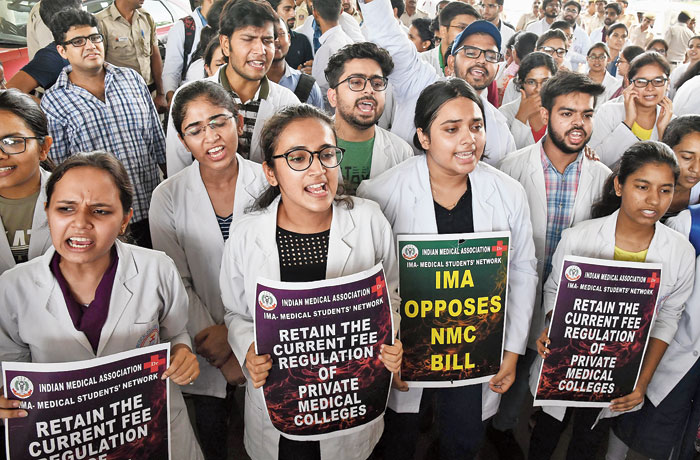The Rajya Sabha on Thursday passed the National Medical Commission (NMC) Bill, 2019, for a new regulatory structure for medical education amid concerns among sections of doctors and parliamentarians that its provisions would legitimise quackery and increase medical college fees.
Union health minister Harsh Vardhan described the bill as the “biggest reform of recent times in the field of medical education” and sought to allay such concerns, saying the government would continue to penalise quackery and fees would be adequately capped.
The health minister also announced an amendment changing the constitution of the NMC after a debate in the Rajya Sabha.
The Lok Sabha had passed the NMC bill on July 29, triggering nationwide protests from resident doctors, medical students and the Indian Medical Association, the country’s largest body of doctors.
Resident doctors and IMA office-bearers have expressed anger over the NMC’s proposals to regulate only 50 per cent of seats in private medical colleges and grant “community health providers” a “limited licence to practice medicine”.
Associations of resident doctors had on Wednesday threatened to intensify their protests by withdrawing from essential and non-essential medical services if the government brought the bill in the Rajya Sabha.
“What else is this but arrogance,” Harjit Bhatti, vice-president of the IMA’s young doctors’ network, said after the Rajya Sabha passed the bill. “Thousands of resident doctors and medical students have come out on the streets over the past three days. The government has completely disregarded doctors’ views.”
Congress leader Jairam Ramesh, participating in the debate before the bill was passed, said the proposal to regulate fees for 50 per cent of seats in private colleges would open the floodgates for privatisation of medical education.
“I believe in privatisation. I want Air India to be privatised. I want Ashok Hotel to be privatised, and I want many other institutions in the public sector to be privatised,” Ramesh said. “But... medical education is the responsibility of the government,” he said, asking for regulation of fees for 75 per cent of seats.
Harsh Vardhan, in his response to the debate, said the states would have the authority to cap fees on the 50 per cent of seats not regulated through the NMC.
The minister also agreed to amend the constitution of the NMC. The commission would have 14 members nominated by the Centre, 10 from the states, and nine independent members, instead of the initially proposed 14 members from the Centre, six members from states and five independent members.
Ramesh also echoed medics’ concerns relating to community health providers, saying the language contained in the NMC bill suggests that its provisions encourage quackery.
A clause in the bill said the commission “may grant limited license to practice medicine at mid-level as community health provider to such person connected with modern scientific medical profession who qualify such criteria” that would be specified through rules.
“What is this language?… You are going to allow compounders! You are going to allow blood sample testers! All persons connected with modern scientific medical profession. If this is not going to open flood gates to quackery, I do not know what will,” Ramesh said.
“The community health provider is a very very dangerous proposition,” Ramesh said, arguing that states should be given the freedom to determine who should become community health providers and what services they will provide based on states’ needs.
Harsh Vardhan, in his response, said the NMC would determine who would be granted titles of community health providers after extensive consultations.










